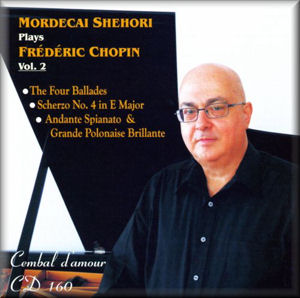 |
 |
| 
Support
us financially by purchasing this disc from: |
|
|
|
|
|
Fryderyk CHOPIN (1810-1849)
Ballade No.1 in G minor, Op.23 (1835) [9:24]
Ballade No.2 in F major, Op.38 (1836-39) [7:47]
Ballade No.3 in A flat major, Op.47 (1841) [7:41]
Ballade No.4 in F minor, Op.52 (1842) [11:58]
Scherzo No.4 in E major, Op.54 (1842) [12:20]
Andante Spianato and Grande Polonaise Brillante, Op.22 (1830-39)
[13:37]
 Mordecai Shehori (piano)
Mordecai Shehori (piano)
rec. April 2011, Las Vegas (Ballades); July 2003 (Scherzo) and August
2002 (Andante Spianato and Grande Polonaise Brillante)
 CEMBAL D’AMOUR CD160 [62:49]
CEMBAL D’AMOUR CD160 [62:49]
|
|
|
It’s important, and valuable, when considering a performance,
to get behind the notes to the conception. To put it another
way, why does a musician play in such-and-such-a-way?
In this intriguing recital, pianist Mordecai Shehori is trenchant
in his view that the nexus between text and music lies at the
heart of these Ballades, and that one ignores the tales, stories
and folkloric influences that animate them at one’s peril; the
peril is intellectual, and cultural as well as, therefore, digital.
Thus he is at pains to describe the ballads that gave rise to
Chopin’s inspiration: Conrad Wallenrod, The Switez (The Lake
of the Wills), Ondine and The Three Budrys. I will leave you
to read his fascinating essay on ‘The Time-Definition Element
in Music’ as it relates to these performances, but let me briefly
point out just one issue, which is the important use of reminiscence
embedded in the Ballades.
Shehori is on combative form here, taking a swipe at ‘‘today’s
star performers’ intellectual capacity’’, about the lack of
which he is scathing. I’m not wholly convinced that this is
a sympathetic line to take, though one appreciates that there
must be a considerable amount of frustration (as well as scorn)
behind it. No names are mentioned, but the condemnation is sweeping.
The most important thing, clearly, is the nature of the performances.
Shehori’s G minor Ballade is a fascinating example of ‘narrative’
musicianship. The novel phrasing, emphases, limited use of the
pedal, strong dynamics and deliberately stricken episodes -
all perfectly calculated - support his thesis as to the musico-literary
basis of the Ballades. To those unsympathetic it will, however,
strike one as curiously didactic, and off-hand, with phrases
tossed away. To others it will be a welcome injection of cultural
sensitivity. For myself, cards on the table, I don’t much like
it. One should know better than to think Shehori will perform
the canon in some accepted, or standardised or — as he would
doubtless see it — homogenised way. The F major explicitly contrasts,
in a most unusual way, the sheer stillness of nature (sheets
of ice) with the story of the Moors’ grisly revenge against
the Spaniards. One understands precisely here what Shehori is
trying to convey in the intense pictorial-narrative of the ballad
in musical form. Thus he is even more becalmed than Cortot in
his famous 1929 recording, though the contrasts between episodes
are not quite as violent with Shehori as they are with Cortot.
Shehori might well reply that in the ballad, Count Wallenrod
is speaking of this incident, it’s not being cinematographically
relayed, thus a degree of restraint is in order, indeed it is
possibly the more sinister for being withheld slightly.
The seductive Ondine haunts the third Ballade where Shehori
seems reluctant to replicate the kind of sense of fantasy that
Rachmaninoff and Cortot both sought and located in her depths.
The dry studio acoustic doesn’t help, nor the drily phrased
opening section. Here I feel a want of flexibility. In the F
minor Ballade I don’t feel the kind of bardic heroism espoused
by such as Moiseiwitsch, Rubinstein or Cortot. Rather, I feel
the influence of Mindru Katz, in Shehori’s deeply poetic but
not indulgent unravelling of The Three Budrys. It contains something
of Katz’s own natural sense of rubato and whilst it is somewhat
faster than Katz’s very measured performance, it shares distinct
aesthetic links. It serves the music in Shehori’s own terms,
even though my own tastes lie elsewhere — Ivan Moravec’s limpid
poetry, for example, as well as the trio already cited.
The difficult element of these performances does no more than
to throw up challenges to received thinking. For Shehori is
a thinker, and clearly scorns the idea of music performed in
a cultural vacuum. His thesis is well argued and his performances
are grounded in a strong sense that the Ballades are narrative,
literary creations conceived in a richly cultivated milieu.
The corollary is sometimes a lack of expressive nuance and bravura.
The remainder of the programme was recorded a decade or so earlier.
The Scherzo No.4 in E major and Andante Spianato and Grande
Polonaise Brillante have plenty of digital legerdemain
but the slightly ascetic approach is rather objectified, I feel.
This has been a challenging review because Shehori has recorded
a challenging set of the Ballades. They deserve to be listened
to, considered, agreed with, dissented from, accepted or rejected,
or combinations thereof. I hope I’ve set out his case as succinctly
as I can. Admiring Shehori as I do, I can only say that he has
given me several very problematic weeks mulling over these performances.
Jonathan Woolf
Support
us financially by purchasing this disc from: |
|
|
|
|
|
|

